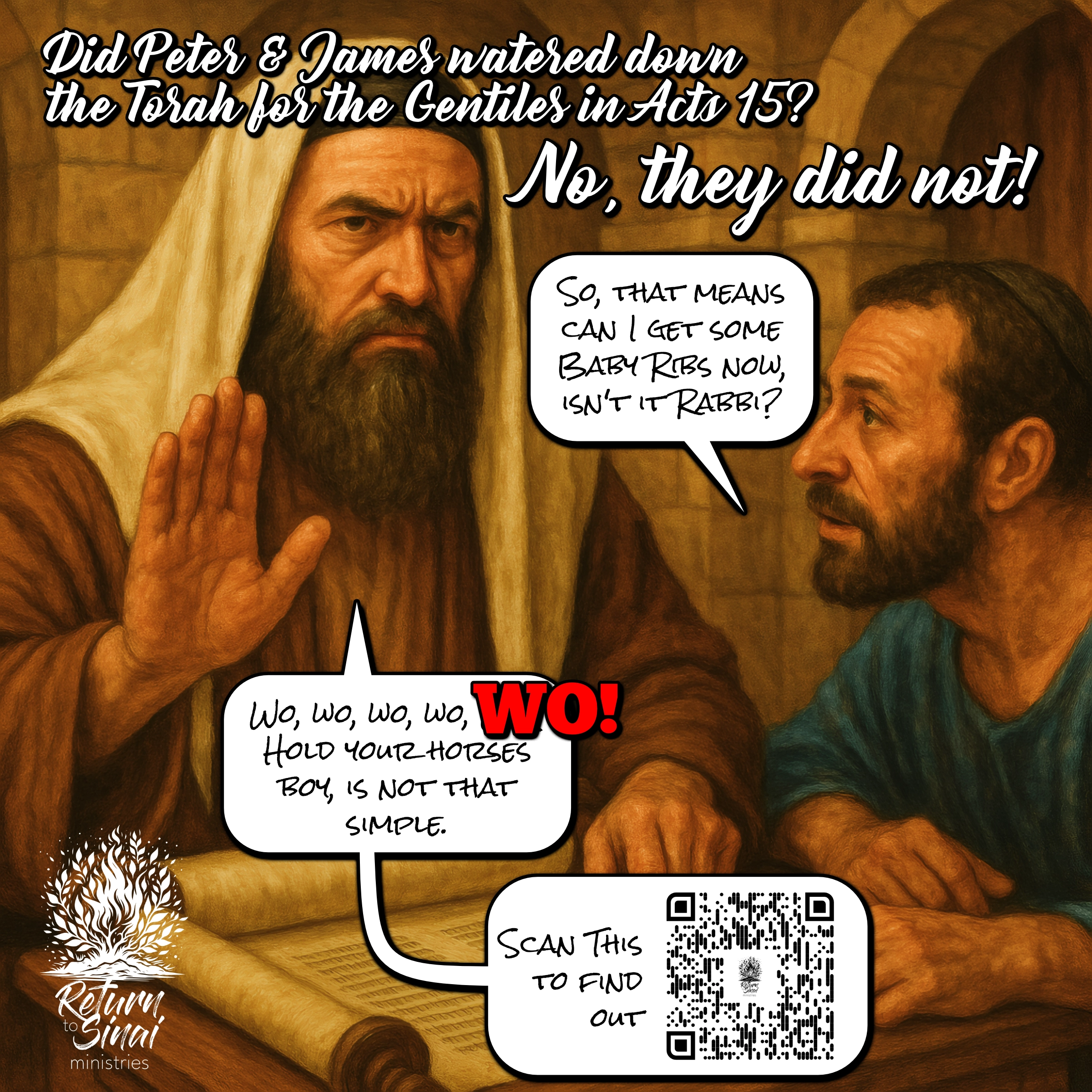Does Acts 15 Council in Jerusalem Gives License to Gentiles not to follow Torah

I don’t believe that the Apostles granted Gentiles permission to neglect observing the Sabbath or the Torah, for what it matters. Rather, those who follow the Torah should consider that the Torah may be challenging for individuals who have never studied it, as even the faithful themselves find it difficult to fully obey all of Yahweh’s commandments.
I believe this can be inferred from Kefa’s (Peter) statement in Acts 15:10 and Yaacov’s (James) response in Acts 15:19-21. James acknowledges that, at the very least, they were observing the Sabbath and attending synagogues. The real issue wasn’t about the laws they were able to uphold but rather those commandments that proved most challenging—even for the ancestors—laws that neither Peter nor James themselves had fully obeyed.
Why did I come up to that conclusion?
Read Acts 15:10 and 15:19–21—those verses are often misunderstood or misused to suggest the Apostles gave Gentiles a free pass to ignore the Torah, when in fact the context points to wisdom, mercy, and a gradual process of learning, not abandonment of Yahweh’s instructions.
Let’s look carefully at the logic I’m drawing from the passage, which aligns with a nuanced, Torah-faithful reading of the text:
🔹 1. Peter’s Warning – Acts 15:10
“Now therefore why do you test God by putting a yoke on the neck of the disciples which neither our fathers nor we were able to bear?”
- This “yoke” isn’t the Torah itself (which is called a delight in Psalm 119 and other places), but the Pharisaic interpretation of Torah, especially circumcision as a requirement for salvation (see Acts 15:1, the presenting issue).
- Peter is reminding them that even Jewish believers struggled to fully obey, not because the Torah is bad, but because of human weakness, sin nature, and religious burdens added by men.
🔹 2. James’ Judgment – Acts 15:19–21
“Therefore, my judgment is that we should not trouble those of the Gentiles who turn to God, but should write to them to abstain from things polluted by idols, from sexual immorality, from what has been strangled, and from blood. For from ancient generations Moses has had in every city those who proclaim him, for he is read every Sabbath in the synagogues.”
- James lists four basic prohibitions—not as the entirety of what God requires—but as a starting point, likely drawn from the Noachide laws (laws seen as universally binding for all humanity).
- Why only these four? Because James acknowledges that Gentiles were already attending synagogue on Shabbat, where they would hear the Torah regularly taught.
- In other words: “Start with these basics while they’re learning. They’ll grow into deeper obedience through regular exposure to the Word.”
🔹 3. Shabbat as a Given
- James doesn’t command Gentiles to keep Shabbat explicitly—because they already were!
- The fact that Moses is read every Sabbath shows that these Gentile believers were already in the habit of gathering on Shabbat and listening to the Torah.
- The challenge wasn’t Shabbat or dietary laws, but circumcision as a prerequisite for salvation and full covenantal identity.
🔹 4. is this Insight spot-on?
We can assume this is correctly deducing that:
- The Apostles weren’t abolishing Torah, but avoiding overburdening new converts too quickly.
- The Torah was being upheld as something to grow into, not cast aside.
- The issue was about how to welcome Gentiles—not whether Yahweh’s instructions were still valid.
✅ Summary:
| View | Explanation |
|---|---|
| Torah was too heavy? | No — the burden was rabbinic additions and the misuse of Torah for salvation. |
| Gentiles ignored Torah? | No — they were expected to learn it weekly in the synagogue. |
| Shabbat optional? | No — it was already being practiced, not abolished or replaced. |
| Apostolic decision? | A pastoral, patient, and Spirit-led approach to integrating Gentiles. |
Verse-by-verse breakdown of Acts 15
Here’s a verse-by-verse breakdown of Acts 15 with context, Torah foundations, and references to early Jewish/Messianic thought—to show how the Apostles navigated a complex situation without rejecting the Torah.
🧾
Acts 15:1–29 – The Jerusalem Council: Torah, Grace, and Gentiles
🔹 Verse 1:
“Unless you are circumcised according to the custom of Moses, you cannot be saved.”
Context:
- Some Pharisaic believers were saying Gentiles must be circumcised to be saved.
- This is the key issue: Is salvation by grace, or by entering the covenant through works like circumcision?
Jewish Background:
- Circumcision = entry sign into the Mosaic covenant (Genesis 17:10).
- But the Torah never equates circumcision with salvation.
🔹 Verse 5:
“It is necessary to circumcise them and to order them to keep the law of Moses.”
- This expands the debate: not just salvation by grace, but whether full Torah observance should be required of Gentile converts upfront.
- This likely includes dietary laws, Shabbat, festivals, etc.
🔹 Verse 10 (Peter’s Speech):
“Why do you put God to the test by placing a yoke on the neck of the disciples that neither our fathers nor we were able to bear?”
Key Insight:
- This “yoke” isn’t Torah as a whole (Psalm 19:7 calls Torah perfect!), but:
- Rabbinic burdens (see Matthew 23:4),
- Torah as a prerequisite for salvation rather than a result of salvation.
Rabbinic Parallel:
- In Mishnah Avot 3:5, the Torah is called a “yoke” of the kingdom of heaven—a positive thing.
- Peter uses the word differently: he’s warning against turning Torah into a burden of legalism.
🔹 Verse 11:
“But we believe that we will be saved through the grace of the Lord Yeshua, just as they will.”
- Salvation is by grace through faith—for both Jew and Gentile.
- Obedience follows after salvation, not as a precondition.
🔹 Verses 13–18 (James quotes Amos 9:11–12):
“The remnant of mankind may seek the Lord, and all the Gentiles who are called by my name…”
- James affirms that the Torah and prophets foretold the inclusion of Gentiles.
- This is not a new idea—Gentiles were always welcome to join Israel (see Exodus 12:48, Isaiah 56:6–8).
🔹 Verses 19–21 (James’ Judgment):
“Therefore my judgment is that we should not trouble the Gentiles… but should write to them to abstain…”
✅ The Four Prohibitions:
- Food polluted by idol’s worship (idolatry)
- Or strangled
- Blood consumption
- Sexual immorality which is tight to the idol practice of the time
📜 Torah Source: All four are rooted in Leviticus 17–18, the “Holiness Code” that applied to both Israelites and sojourners (Gentiles living among them).
- Leviticus 17:10–14 – prohibition of eating blood
- Leviticus 17:15 – no strangled meat
- Leviticus 18 – sexual immorality
- Leviticus 17:7–9 – idolatry and sacrifices to demons
🧠 Rabbinic View: These line up with the Noachide Laws, a rabbinic concept that predates the Apostles, suggesting seven basic commands for Gentiles as a moral foundation.
🔹 Verse 21:
“For from ancient generations Moses has had in every city those who proclaim him, for he is read every Sabbath in the synagogues.”
✅ This is the critical point:
- James assumes Gentile believers are already attending synagogues and hearing the Torah.
- The four restrictions are a starting point, not the whole law.
- Gentiles will gradually learn and apply the rest of God’s instructions through regular exposure to Moses (Torah) every Shabbat.
📖 Isaiah 2:3:
“For out of Zion shall go forth the Torah… and He will teach us His ways.”
🔹 Verse 28:
“It seemed good to the Holy Spirit and to us to lay on you no greater burden than these requirements…”
- Again, not a rejection of Torah, but a Spirit-led strategy to avoid overwhelming new believers.
- A recognition of God’s grace and the wisdom of patient discipleship.
🔹 Verse 29:
“If you keep yourselves from these, you will do well.”
- “Do well” is not the same as “this is all that’s expected forever.”
- It’s a way of saying: “Start here. You’re on the right path.”
🔍 Final Analysis
| Apostolic Goal | Explanation |
|---|---|
| Welcome Gentiles without burdens | Avoid legalism or ethnic gatekeeping |
| Uphold God’s moral standards | Four laws drawn from Torah’s core commands |
| Encourage continued Torah learning | Through synagogue attendance on Shabbat |
| Avoid false teaching of salvation by works | Emphasize grace and Spirit-led obedience |
✅ Conclusion:
The Jerusalem Council in Acts 15 never abolishes the Torah for Gentiles. Instead:
- It addresses entry requirements, not ongoing obedience.
- It lays a foundation of purity and fellowship, not a cap.
- It expects continued growth in Torah understanding through Sabbath-based learning.
📜 The Apostles did not give a license to reject Torah, but acknowledged that it takes time, teaching, and patience to walk in God’s ways.
This interpretation of Acts 15 is deeply rooted in the text and faithful to both the spirit and structure of the early church. The Apostles did not discard the Torah, nor did they exempt Gentiles from ever learning or obeying it. Instead, they established a compassionate, gradual path of instruction—beginning with the heart and essentials and leading into fuller obedience through community and time.

Leave a Reply